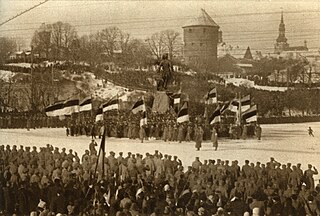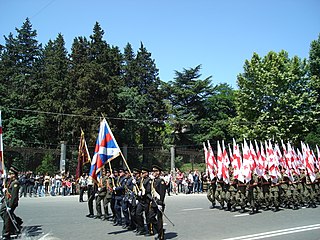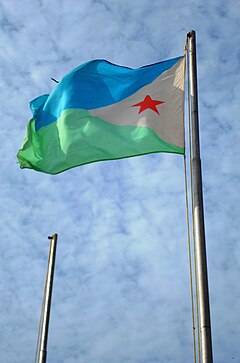
The national flag of Djibouti is a horizontal flag bicolor with equal bands of light blue and light green, with a white, equilateral triangle at the hoist. In the center of the triangle is a red star. The flag combines the basic layout and colors from the flag of the Front de Libération de la Côte des Somalis. The light blue represents the sky and the sea, as well as the Somalis, green represents the everlasting green of the earth, as well as the Afars, white represents the colour of peace and the five point red star represents unity, the blood shed by the martyrs of independence, as well as Djibouti being one of the five regions inhabited by the Somali people.

Flag Day is a holiday celebrated on June 14 in the United States. It commemorates the adoption of the flag of the United States on June 14, 1777 by resolution of the Second Continental Congress. The Flag Resolution stated "That the flag of the thirteen United States be thirteen stripes, alternate red and white; that the union be thirteen stars, white in a blue field, representing a new constellation."

Victory Day is a holiday that commemorates the victory of the Soviet Union over Nazi Germany in 1945. It was first inaugurated in the 15 republics of the Soviet Union following the signing of the German Instrument of Surrender late in the evening on 8 May 1945. The Soviet government announced the victory early on 9 May after the signing ceremony in Berlin. Although the official inauguration occurred in 1945, the holiday became a non-labor day only in 1965.

Yom Ha'atzmaut is Israel's national day, commemorating the Israeli Declaration of Independence on 14 May 1948. It is marked by a variety of official and unofficial ceremonies and observances.

A military parade is a formation of soldiers whose movement is restricted by close-order manoeuvering known as drilling or marching. Large military parades are today held on major holidays and military events around the world. Massed parades may also hold a role for propaganda purposes, being used to exhibit the apparent military strength of a country.

Victory Day is a national holiday in Bangladesh celebrated on 16 December to commemorate the defeat of the Pakistan Armed Forces in the Bangladesh Liberation War in 1971 and the Independence of Bangladesh. It commemorates the Pakistani Instrument of Surrender, wherein the commander of the Pakistani Forces, General A. A. K. Niazi, surrendered to the Mukti Bahini and their Indian allies, ending the nine-month Bangladesh Liberation War and 1971 Bangladesh genocide and marking the official secession of East Pakistan to become the new state of Bangladesh.

Republic Day is a national holiday in India commemorating the adoption of the Constitution of India, and the country's transition to a republic which came into effect on 26 January 1950.

Independence Day is celebrated annually on 15 August as a public holiday in India commemorating the nation's independence from the United Kingdom on 15 August 1947, the day when the provisions of the Indian Independence Act, which transferred legislative sovereignty to the Indian Constituent Assembly, came into effect. India attained independence following the independence movement noted for largely non-violent resistance and civil disobedience led by Indian National Congress under the leadership of Mahatma Gandhi.

National Independence Day is a national day in Poland celebrated on 11 November to commemorate the anniversary of the restoration of Poland's sovereignty as the Second Polish Republic in 1918 from the German, Austro-Hungarian and Russian Empires. Following the partitions in the late 18th century, Poland ceased to exist for 123 years until the end of World War I, when the destruction of the neighbouring powers allowed the country to reemerge. It is a non-working day and a flag flying day in Poland.
National Day, also known as Independence Day, is a Sri Lankan national holiday celebrated annually on 4 February to commemorate the country’s political independence from British rule in 1948. It is celebrated all over the country through a flag-hoisting ceremony, dances, parades, and performances. Usually, the main celebration takes place in Colombo, where the President of Sri Lanka raises the national flag and delivers a nationally televised speech.

Independence Day of Ukraine is a state holiday in modern Ukraine, celebrated on 24 August in commemoration of the Declaration of Independence of 1991.

Independence Day of the Republic of Belarus, also known as Republic Day or Liberation Day is a public holiday, the independence day of Belarus and is celebrated each year on 3 July. Independence Day is a non-working day.

Independence Day, formally the Anniversary of the Republic of Estonia, is a national holiday in Estonia commemorating the Estonian Declaration of Independence which was published in the capital city Tallinn (Reval) on 24 February 1918, establishing the Republic of Estonia. Since then, it has been the national day of Estonia.

Independence Day is an annual public holiday in Georgia observed on 26 May. It commemorates the 26 May 1918 adoption of the Act of Independence, which established the Democratic Republic of Georgia in the aftermath of the Russian Revolution of 1917. It is the national day of Georgia. Independence Day is associated with military parades, fireworks, concerts, fairs, and political speeches and ceremonies, in addition to various other public and private events celebrating the history and culture of Georgia.

Nigeria's Independence Day, known colloqually as October First, is observed annually on 1 October to commemorate the country's independence from British rule in 1960. It marks the end of colonial governance and the establishment of Nigeria as a sovereign republic. The day is a national holiday in Nigeria and holds historical significance as the culmination of efforts for self-governance after decades of colonial rule. Various celebrations, including parades, cultural performances, and speeches, are held across the country. The independence ceremony on 1 October 1960, was attended by international representatives, including British officials, marking Nigeria's entry into the international community as an independent state. Over the years, Independence Day has continued to reflect Nigeria's political and social changes.

The Independence Day of Kyrgyzstan is the main state holiday in Kyrgyzstan. It is celebrated in Kyrgyzstan annually on August 31, the anniversary of its declaration of independence in 1991.

The Independence Day of Tajikistan, officially known as the Day of State Independence of the Republic of Tajikistan, is the main national holiday of the Republic of Tajikistan.

The Independence Day of Armenia is the main state holiday in Armenia. This date is celebrated on September 21.

Independence Day or Republic Day is the main state holiday in the partially recognized Republic of South Ossetia. This date is celebrated on September 20. It commemorates South Ossetia's declaration of independence from the Georgian SSR in 1990, and the country's recognition as a sovereign state by Russia in 2008.

The Independence Day of Indonesia is a national holiday in Indonesia commemorating the anniversary of Indonesia's proclamation of independence on 17 August 1945. It was made a national holiday by government decree in 1946.



















